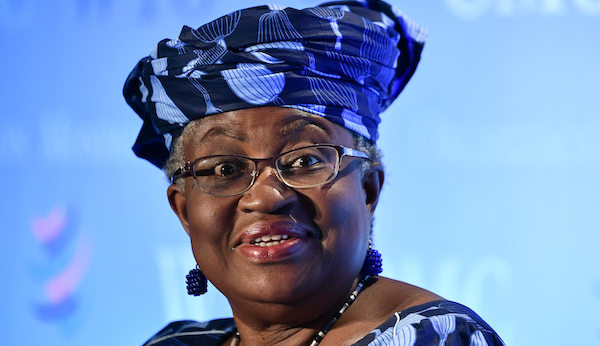Business
Okonjo-Iweala cautions governors on excessive borrowing, harps on IGR

The Director-General of the World Trade Organisation (WTO), Dr. Ngozi Okonjo-Iweala, on Monday, cautioned the 36 state governors on excessive borrowing.
Okonjo-Iweala, who spoke at the Nigeria Governors’ Forum (NGF) 2023 induction for newly elected governors, challenged the state chief executives to improve on their states’ Internally Generated Revenue (IGR) and ensure transparency in the management of resources.
She said: “Nigeria’s gross debt level has climbed from N19.3 trillion in 2015 to N91.6 trillion in 2023. The debt-to-GDP ratio has almost doubled from 20 percent to 39 percent over that time period.
“While the debt-to-GDP ratio may not look so alarming as revenues decline, the burden of debt servicing has increased dramatically.
“The debt service to revenue ratio is certainly alarming at 83.2 percent in 2021 and 96.3 percent in 2022, according to the World Bank.
“This means that at the federal level after servicing our debt, there is little room to pay for recurrent expenditures let alone investment.”
Okonjo-Iweala warned that it would be difficult for the incoming administration to address the fiscal deficit with an oil subsidy bill of N3.36 trillion.
She noted that the deficit was made worse by revenue losses from oil theft.
The WTO chief added: “On the revenue side, states have a substantial responsibility. Too few states are raising internally generated revenue of any significance.
“Data from the National Bureau of Statistics and State Audited Financial Statements by the civic-tech group BudgIT indicated that 33 states relied on federal transfers for the majority of their revenues.
“For 13 of these states, monthly Federation Accounts Allocation Committee (FAAC) allocations accounted for over 70 percent of revenue.
“Aggregated IGR from the 36 states did rise from N1.2 trillion in 2020 to N1.61 trillion in 2021 – but this pales in comparison to FAAC allocations to states of N2.23 trillion in 2020, N2.42 trillion in 2021 (and N3.16 trillion in 2022).
READ ALSO: DMO boss, Oniha, counsels incoming govt on dept management, borrowings
“While I commend those states that have made additional efforts, governors need to do much more. States must figure out ways to increase IGR.
“This goes hand in hand with using your 48 percent share of federal allocations more transparently, efficiently, and effectively.
“You must share with your state citizens how much FAAC allocation you receive each month, how much IGR you collect, and how you spend it.
“We used to publish this information routinely during my time as finance minister under Presidents Obasanjo and Jonathan. We must resume this practice so your citizens can hold you accountable.
“Please watch your debt profiles, and keep careful control of expenditures, even as you invest in infrastructure, education, and basic health systems.
“Please endeavour to pay teachers, health workers, and others their salaries, and retirees their pensions.”
On her part, the Deputy Secretary-General of the United Nations, Amina Mohammed, urged the governors to deliver better governance to regain the trust of the people for a more cohesive nation.
Join the conversation
Support Ripples Nigeria, hold up solutions journalism
Balanced, fearless journalism driven by data comes at huge financial costs.
As a media platform, we hold leadership accountable and will not trade the right to press freedom and free speech for a piece of cake.
If you like what we do, and are ready to uphold solutions journalism, kindly donate to the Ripples Nigeria cause.
Your support would help to ensure that citizens and institutions continue to have free access to credible and reliable information for societal development.


























